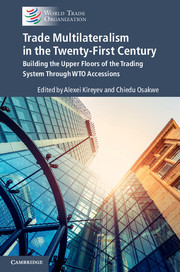 Trade Multilateralism in the Twenty-First Century
Trade Multilateralism in the Twenty-First Century from PART II - Negotiators’ Perspectives on the WTO Accession Process
Published online by Cambridge University Press: 28 November 2017
Abstract
WTO membership has long been an integral part of the overall strategic objectives of Afghanistan. For a post-conflict, landlocked and least-developed economy, joining the WTO was perceived as an opportunity to achieve economic stability, improve regional security and cooperation, alleviate poverty and achieve peace. Afghanistan has been on an eleven-year journey to integrate into the multilateral trading system. Its WTO accession process, described in this chapter, was a learning experience in which Afghanistan's governmental and academic institutions, private sector and civil society all upgraded their capacity, using this accession as a catalyst to accelerate structural reforms and strengthen market instruments. The enormous reforms accomplished in this process have allowed Afghanistan to build a more favourable trade and investment regime, with effective laws and trade policies based on the WTO agreements. This chapter sheds light on the accession process and the accomplished domestic transformation and identifies ways forward to maximize the benefits of Afghanistan's WTO membership as a tool for cementing its long-standing commitment to an open economy, rule of law, good governance and international cooperation.
Afghanistan is a landlocked least-developed country (LDC). Its territory covers about 652,000 square kilometres and it has a population of approximately 32 million. It is bordered by Pakistan in the south and east, Iran in the west, Tajikistan, Turkmenistan and Uzbekistan in the north, and China in the far north-east. Several decades of war and disorder have had a devastating impact on the Afghan people. Millions have been killed and millions more have been forced to flee their homes.
Stability is still a major concern and the economy remains weak. Commercial connections to regional and global economies have been severely disrupted by the civil conflict. Hard infrastructure, including roads and reliable supplies of water and power, has largely been destroyed and is inadequate to support rapid, sustained economic growth. Soft infrastructure, including human and institutional capacity necessary for an economy to function, also remains limited.
After many years of instability, Afghanistan continues to face daunting challenges. The perilous security situation has hurt confidence and growth. Afghanistan is undergoing a challenging political, security and economic transition necessary for robust and inclusive economic growth.
To save this book to your Kindle, first ensure [email protected] is added to your Approved Personal Document E-mail List under your Personal Document Settings on the Manage Your Content and Devices page of your Amazon account. Then enter the ‘name’ part of your Kindle email address below. Find out more about saving to your Kindle.
Note you can select to save to either the @free.kindle.com or @kindle.com variations. ‘@free.kindle.com’ emails are free but can only be saved to your device when it is connected to wi-fi. ‘@kindle.com’ emails can be delivered even when you are not connected to wi-fi, but note that service fees apply.
Find out more about the Kindle Personal Document Service.
To save content items to your account, please confirm that you agree to abide by our usage policies. If this is the first time you use this feature, you will be asked to authorise Cambridge Core to connect with your account. Find out more about saving content to Dropbox.
To save content items to your account, please confirm that you agree to abide by our usage policies. If this is the first time you use this feature, you will be asked to authorise Cambridge Core to connect with your account. Find out more about saving content to Google Drive.